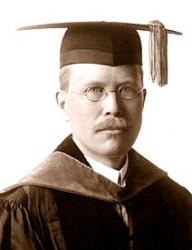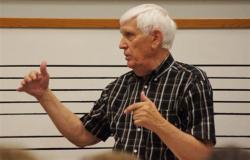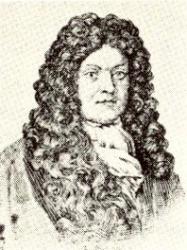Planning worship?
Check out our sister site, ZeteoSearch.org,
for 20+ additional resources related to your search.
- |
User Links
Person Results
D. T. Niles

1908 - 1970 Person Name: D T Niles Author of "Saranam (Jesus, Saviour, Lord)" in In Every Corner Sing
D. T. Niles
Walter G. Whinfield
1865 - 1919 Person Name: Walter G. Whinfield, 1865-1919 Composer of "UNIVERSAL PRAISE" in The Cyber Hymnal
Walter G. Whinfield
Lindsay B. Longacre

1870 - 1952 Composer of "RIVERDALE" in The Riverdale Hymn Book Lindsay Bartholomew Longacre was born in Pottsville, Pennsylvania, on January 26, 1870, the son of Orleans and Rachel (Bartholomew) Longacre. Longacre wanted to become a musician, but pursuant to his father’s wishes, he attended the Columbia University School of Mines and was graduated from there with a degree in mining engineering in 1892. Following a call to the ministry, he attended Drew Theological Seminary, where he received a B.D. degree in 1896, and was subsequently ordained a minister in the Methodist Church that same year.
From 1896-1910, Rev. Longacre served several small churches in the New York Conference.
These included Glenville, St. Luck, Madison Avenue (later called Christ Methodist after a move to a new location), Fifty-Sixth Street Church, Morris Heights, and Woodlawn Heights. His pastorate at Madison Avenue Church was as the Assistant Pastor to Andrew Longacre, his uncle.
In 1910, Dr. Longacre was appointed head of the Department of Old Testament Literature and Religion of the Iliff School of Theology. He held that position for 32 years. On several occasions during his tenure at Iliff, Dr. Longacre also acted as president of the school. He authored four books, a number of articles, and church school curriculum. His books are: A Prophet of the Spirit: A Sketch of the Character and Work of Jeremiah (1917 and 1922); Amos, Prophet of a New Order (1921; translated into Burmese in 1939); Deuteronomy, A Prophetic Lawbook (1924); and The Old Testament: Its Form and Purpose (1945). He was invited to submit three articles to the Abingdon Bible Commentary(1929). These articles are entitled “The Bible as Literature,” Numbers,” and “Joshua.” Dr. Longacre also held membership in the National Association of Biblical Instructors and the Society of Biblical Literature and Exegesis.
During his tenure at Iliff, Dr. Longacre was involved in a controversy known as the “fundamentalist-modernist controversy.” This controversy, which reached its height in the 1920s, grew out of reactions to the liberal approach that the school had taken toward religion and education. These reactions, from both inside and outside the Methodist Church, were in response to the school’s use of higher criticism in the teaching of Biblical studies.
While at Iliff, Dr. Longacre also taught courses in preaching, worship, and hymnology. He had nurtured his love for music as an avocation, and wrote many hymns and songs. Some of these hymns were published in The Riverdale Hymn Book (1912), The Methodist Hymnal (1935), The Hymnal (Evangelical and Reformed Church) (1941), and The Story of Our Hymns: The Handbook to the Hymnal of the Evangelical and Reformed Church (1952). He believed that great hymns were “God-centered.” In addition to composing music, he wrote explanatory notes for various Denver Symphony programs, and had a special love for opera. He also held membership in the Hymn Society of America, the American Guild of Organists, and the Quill Club of New York.
In his courses on worship, Dr. Longacre expected no loess that excellence from his students in planning and leading services. He felt that worship should be be “truly theocentric.” Because of his interests in music and worship, he served on the Commission on Ritual and Orders of Worship of the Methodist Church from 1940-44. The Commission produced a new Book of Worship for Church and Home. Dr. Longacre contributed introductory sentences to accompany selected readings in two sections: “Scriptures for Reading and Meditation” and “Daily Readings and Prayers for a Month.”
Dr. Longacre retired from Iliff in 1942. He and Florence Biggart Longacre, his second wife of six years, then made a brief move to California. (His first wife, Arabella Hyland Longacre, had passed away in 1930.) After returning to Denver, he played a leading role in the 1944 University of Denver production of Thornton Wilder’s Our Town. It was his first acting experience. That same year, the Longacre’s returned to New York City to pursue his interest in music and the arts through the cultural activities of the city. From 1947-1952, Dr. Longacre served as the Assistant Pastor to the Rev. Ralph W. Sockman of Christ Methodist Church.
Dr. Lindsay B. Longacre died at the age of 82 years on September 18, 1952, after a long and distinguished career of service to the church and humanity.
© 2002. Marshall Eidson
http://www.iliff.edu/research/archives/longacre/bio.htm
Lindsay B. Longacre
Jack Boyd

b. 1932 Arranger of "ALL THE WORLD" in Great Songs of the Church (Revised) Jack Arthur Boyd (b. Indianapolis, Indiana, February 9, 1932) was the music editor of *Great Songs of the Church, Revised*, published by ACU Press in 1986. He earned a B.S. degree in music education from Abilene Christian University, a masters degree in music composition and theory from the University of North Texas, and a Ph.D. in choral literature from the University of Iowa. Boyd edited *Children, Rejoice!* (Sweet, 1979) and he authored *Rehearsal Guide for the Choral Director* (Parker, 1970) and *Leading the Lord's Singing* (Quality, 1981). He is a member of Churches of Christ and lives in Abilene, Texas.
Monty Lynn
Jack Boyd
Basil Harwood

1859 - 1949 Composer of "LUCKINGTON" in Hymns and Psalms Basil Harwood (11 April 1859 – 3 April 1949) was an English organist and composer.
Basil Harwood was born in Woodhouse, Gloucestershire (the second youngest of 12 children) on 11 April 1859. His mother died in 1867 when Basil was eight. His parents were Quakers but his elder sister Ada, on reaching 21 in 1867, converted to the Anglican Church. Basil was allowed to attend the ceremony at the Church of England in Almondsbury and this is where he was first drawn to organ music and choral singing. His father, Edward, remarried two years later in 1869 to a lady from an Anglican family. Basil was now sent to the Montpellier School in Weston-super-Mare for a year. In 1871, at 12 he was enrolled in Clevedon, the preparatory school for Charterhouse where he was first to formally study music.
He went up to Charterhouse in 1874 and left in 1876 having won a leaving Exhibition to Trinity College, Oxford where he initially studied Classics (1879) and Modern History (1880). He then studied for a further two years, 1881–1882, at the Leipzig Conservatory under Carl Reinecke and Salomon Jadassohn. It was here in 1882, Basil composed his first anthem for chorus and organ "O Saving Grace." He returned from Leipzig to realise that he had now passed the age limit to study music formally.
In 1883, Basil became organist of St. Barnabas Church, Pimlico completing his Sonata in C# Minor here in 1885, selling the copyright to the publisher Schott for one shilling a year or two later. After this success, he then moved to Ely Cathedral in 1887 where he wrote the bulk of Dithyramb, possibly his greatest organ work. His final appointment was as organist at Christ Church, Oxford and as precentor of Keble College, Oxford from 1892 to 1909. Whilst there he co-founded and conducted the Oxford Bach Choir which helped to earn him his degree as Doctor of Music. He conducted the Oxford Orchestral Association (1892–1898).
He was musical editor of the 1908 Oxford Hymn Book and Examiner for Musical Degrees (1900–1925).
During this time, he met and married Mabel Ada Jennings (the daughter of George Jennings) (who had become a pupil of his in 1896) at All Souls St. Marylebone, London (27 December 1899). Mabel had studied music herself, piano and composition, and was also a writer. She may well have composed lyrics for some of his lesser known tunes. At an advanced age she wrote a small volume of collected poems named Questing Soul.
He retired early at 50 (in 1909) after the death of his father, Edward Harwood, from whom he inherited the family estate of Woodhouse having outlived his seven older brothers. Soon after moving in he had a three manual chamber organ built in the library by Bishop & Sons of Ipswich (now in Minehead Parish Church), on which he promptly finished his Sonata in F# Minor. He continued to compose prolifically.
He was a keen walker, and named many of his hymn tunes after local places that he loved to visit, the most notable being the hymn tunes such as Tockington, Olveston, Almondsbury and Thornbury.
In 1936 advancing in years, he let the Woodhouse estate and moved to Bournemouth. Part of the estate, Woodhouse Down, was later sold to his contemporary Robert Baden-Powell who was two years older than he was and who had also attended Charterhouse School, and is used as a Scout Camp to this day.
In 1939, at eighty, he moved to London, taking a flat in Fleet Street. After a long life, he died on 3 April 1949, eight days short of his 90th birthday, at Courtfield Gardens in the Royal Borough of Kensington, London. A memorial service was held in St Paul's Cathedral on 22 April 1949. Mabel survived him, dying shortly before her 103rd birthday on 20 July 1974. He was survived by two sons; Major John Edward Godfrey Harwood (1900–1996) and Basil Antony Harwood (1903–1990) Senior Master of the Supreme Court, Q.B.D. and Queen's Remembrancer.
His remains are interred in St. Barnabas Church, Pimlico and marked by a plaque inset in floor of the chancel, close to where he would have stood to conduct the choir.
He composed cantatas, church music and works for the organ; his Service in A flat, the anthem O how Glorious and the hymn tunes LUCKINGTON ("Let all the world in every corner sing") and THORNBURY ("Thy hand O God has guided"), first used during a festival of the London Church Choir Association, remain in the Anglican repertory.
--en.wikipedia.org/wiki
Basil Harwood
Martin Shaw

1875 - 1958 Person Name: Martin Shaw, 1876- Composer of "HIGH ROAD" in The Hymnary of the United Church of Canada Martin F. Shaw was educated at the Royal College of Music in London and was organist and choirmaster at St. Mary's, Primrose Hill (1908-1920), St. Martin's in the Fields (1920-1924), and the Eccleston Guild House (1924-1935). From 1935 to 1945 he served as music director for the diocese of Chelmsford. He established the Purcell Operatic Society and was a founder of the Plainsong and Medieval Society and what later became the Royal Society of Church Music.
Author of The Principles of English Church Music Composition (1921), Shaw was a notable reformer of English church music. He worked with Percy Dearmer (his rector at St. Mary's in Primrose Hill); Ralph Vaughan Williams, and his brother Geoffrey Shaw in publishing hymnals such as Songs of Praise (1925, 1931) and the Oxford Book of Carols (1928). A leader in the revival of English opera and folk music scholarship, Shaw composed some one hundred songs as well as anthems and service music; some of his best hymn tunes were published in his Additional Tunes in Use at St. Mary's (1915).
Bert Polman
Martin Shaw
Eleanor Smith
1858 - 1942 Composer of "[Let all the world in ev'ry corner sing]" in The Children's Hymnal b. 6-15-1858, Atlanta, d. 6-30-42, Midland, MI; singer, lecturer, composer
Eleanor Smith
Paul Liljestrand
1931 - 2011 Composer of "CONRAD" in The Worshiping Church Dr. Paul Frederick Liljestrand was born May 15, 1931 in Montclair, NJ, died Feb 17, 2011 in Thomasville, GA. His musical gifts were recognized at an early age and he studied at The Julliard School, beginning in the Pre-College Division and continuing through the Master's Degree program. He spent two years in Japan with the U.S. Army, serving as a Chaplain's Assistant. Following this he returned to New Jersey and studied at Union Theological Seminary for a Master's Degree in Sacred Music. He also served as organist and choir director at Brookdale Baptist Church for 9 years before being called to Calvary Baptist Church in New York City where he served for thirty years. He also taught and was Chairman of the Music Department at both Northeastern Bible College and Nyack College. As the director of the Nyack Chorale, he led his students on many tours. After retiring from Calvary Baptist Church he was organist and choir director at Union Congregational Church in Montclair, NJ for nine years. In 2003 he and his wife moved to Thomasville, GA where Liljestrand became organist and choir director at St. Thomas Episcopal Church and later was Music Director at Trinity Anglican Church.
Both in New Jersey and in Georgia, Liljestrand served as accompanist for many groups and professional musicians, taught piano, organ, and composition, and was a mentor to many young musicians.
Dianne Shapiro, from an Obituary posted on Allen & Allen Funeral Home web site
Paul Liljestrand
S. T. Kimbrough
b. 1936 Person Name: S T Kimborough Translator of "I lift up my eyes to the hills" in In Every Corner Sing
S. T. Kimbrough
Ahasuer Fritsch

1629 - 1701 Person Name: Ahasuerus Fritsch Composer of "DARMSTADT" in The Chapel Hymnal Born: December 16, 1629, Mücheln, Saxony.
Died: August 24, 1701, Rudolstadt, Germany.
With help from the family of a young noble he tutored, Fritsch received a good education, earning his law degree from the University of Jena in 1661. He later became chancellor of the university and president of the Consistory of Rudolstadt. He wrote on numerous subjects, including antiquities, law, and religion, and collected hymns.
Hymns--
"Liebster Immanuel, Herzog der Frommen"
"Dearest Immanuel, Prince of the Lowly"
Music--
WAS FRAG' ICH NACH DER WELT
--www.cyberhymnal.org/bio
Ahasuer Fritsch


 My Starred Hymns
My Starred Hymns


